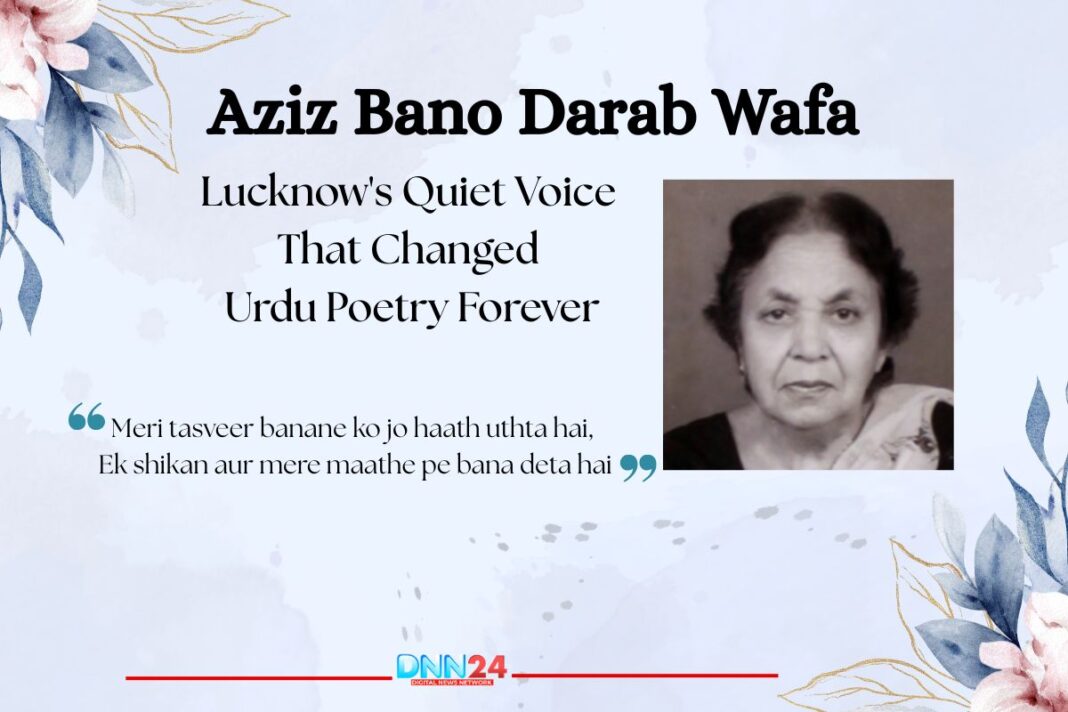Aziz Bano Darab Wafa was born on August 23, 1926, in Badaun, a small town in Uttar Pradesh. Her family had a fascinating history. Her ancestors belonged to the Darabu family of Srinagar, which was a prominent shawl-trading family with business ties to France. Her grandfather was a Persian scholar who settled in Lucknow in 1801.
Ahmiyat ka mujhe apni bhi to andaaza hai,
Aziz Bano Darab Wafa
Tum gaye waqt ki maanind ganwa do mujh ko
This city became the place where she grew up, surrounded by books and intellectual conversations. Her father, a doctor, firmly believed in educating women, a stance that was quite unusual for that time. She studied at Thoburn College and finished her MA in English from Lucknow University in 1949. This education in English literature influenced her Urdu poetry, lending it a modern touch while preserving its traditional beauty.
Ek muddat se khayalon mein basa hai jo shakhs,
Aziz Bano Darab Wafa
Ghaur karte hain to uska koi chehra bhi nahin
She later became a lecturer of English at a women’s college. Poetry was not her career plan. It was something personal, something she did to heal herself. At twenty-three, she started writing verses that felt like pages from a diary. Nobody knew about them. She wrote alone, in quiet corners, for her own peace. Those early poems were filled with sadness, reflection, and questions she could not speak aloud. Writing was her way of breathing when life felt heavy.
Mere haalaat ne yun kar diya patthar mujh ko,
Aziz Bano Darab Wafa
Dekhne walon ne dekha bhi na chhoo kar mujh ko
The Night That Changed Everything
In 1960, an event occurred that drew Aziz Bano out of her private world. A lady named Sultana Begum organized a Mushaira, which is a poetry gathering, in Lucknow. Many poets came to share their work. Among them was Aziz Bano, a woman with gentle eyes and a humble manner. When she stepped up to recite her ghazals, her voice was soft but filled with emotion. The audience listened carefully.
Main ne ye soch ke boe nahin khwabon ke darakht,
Aziz Bano Darab Wafa
Kaun jangal mein uge ped ko paani dega
Among the crowd that evening sat Indira Gandhi, who later became Prime Minister of India. She openly praised Aziz Bano’s poetry. That night became a turning point. The poems that once lived in notebooks now reached thousands of ears through All India Radio. People across the country waited for her voice every week. She spoke like a friend, not like someone distant or unreachable. Her life had many layers.
Charagh ban ke jali thi main jis ki mehfil mein,
Aziz Bano Darab Wafa
Use rula to gaya kam se kam dhuan mera
She was a teacher, a daughter, a thinker, and a woman who carried silent battles inside her. Years later, her collection of poems was named “Goonj,” which means echo. She believed that once you speak a feeling, it travels and touches someone else’s heart. Her poetry was simple but profound. One of her famous lines says, “I didn’t plant trees of dreams thinking, who would water them in the wilderness.” It shows how she dreamed, knowing fully well that dreams often die without care.
Hum aise soorma hain lad ke jab haalaat se palte,
Aziz Bano Darab Wafa
To badh ke zindagi ne pesh ki baisakhiyaan hum ko
A Life Between Courage and Quiet Strength
Aziz Bano Darab Wafa lived during a time when women poets were rarely noticed. Most of the literary world celebrated male voices. But she refused to hide her emotions. She wrote openly about loneliness, love, loss, and the struggles women face. She was part of the Progressive Writers’ Movement, a group of writers who wanted social change. Her poetry spoke against injustice but never became loud or harsh.
Main jab bhi uski udaasi se oob jaungi,
Aziz Bano Darab Wafa
To yun hansega ki mujh ko udaas kar dega.
Instead, it carried a gentle strength. She often wrote about being alone, but not in a sad way. For her, solitude was a place where she could think clearly and meet her authentic self. One of her well-known ghazals begins with the line, “Ruth Jayega To Mujh Se Aur Kya Le Jayega,” which talks about accepting life without bitterness. Her personal life was not easy. She faced heartbreak, loneliness, and the pressure of living in a society that did not always appreciate strong women.
Zindagi ke saare mausam aa ke rukhsat ho gaye,
Aziz Bano Darab Wafa
Meri aankhon mein kahin barsaat baaki reh gayi
But her pen became her companion. Each poem she wrote was a conversation between her courage and her pain. In a radio interview, she once said, “A poet must taste sorrow to understand silence.” That belief made her poetry all the more real. Her friend, the renowned writer Qurratulain Hyder, said that Wafa’s words carried the scent of Lucknow’s culture and the resilience of someone who had survived difficult times.
Hum ne saara jeevan baanti pyaar ki daulat logon mein,
Aziz Bano Darab Wafa
Hum hi saara jeevan tarse pyaar ki paai paai ko
The Echo That Never Fades
Aziz Bano Darab Wafa passed away on January 13, 2005, in Lucknow. She left behind a collection called “Goonj,” which continues to inspire readers to this day. Her poetry is not just about beautiful words. It is about real feelings, real struggles, and real survival. One of her most powerful verses says, “Shiv to nahin hum phir bhi hum ne duniya bhar ke zahr piye,” meaning, “I am not Shiv, yet I have drunk all the poisons of the world.”
Shiv to nahin hum phir bhi hum ne duniya bhar ke zahr piye,
Aziz Bano Darab Wafa
Itni kadwahat hai munh mein kaise meethi baat karen
This line became a symbol of her life. She faced bitterness but did not let it destroy her. Instead, she turned it into poetry. Today, young poets read her work not only to learn about rhyme and rhythm, but also to find courage. Women especially connect with her words because she spoke for those who felt invisible. The Urdu literary world still remembers her with respect. She did not write to become famous.
Ye hausla bhi kisi roz kar ke dekhungi,
Aziz Bano Darab Wafa
Agar main zakhm hoon uska to bhar ke dekhungi
She wrote because words gave her comfort when nothing else did. But through those words, she became something greater. Her voice still echoes in libraries, in old radio recordings, and in the hearts of readers who find her poems. Aziz Bano Darab Wafa proved that poetry is not just art. It is a matter of survival, a form of resistance, and a way to leave something beautiful behind, even after you are gone.
Also Read: Bilqis Zafirul Hasan: The Poet Who Found Her Voice in Silence
You can connect with DNN24 on Facebook, Twitter, and Instagram and subscribe to our YouTube channel.



